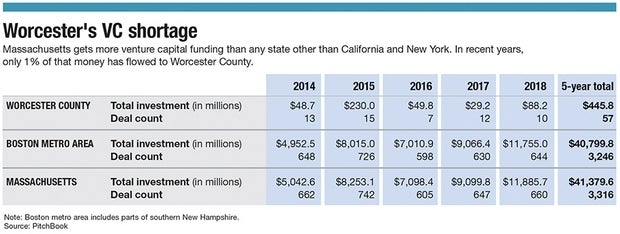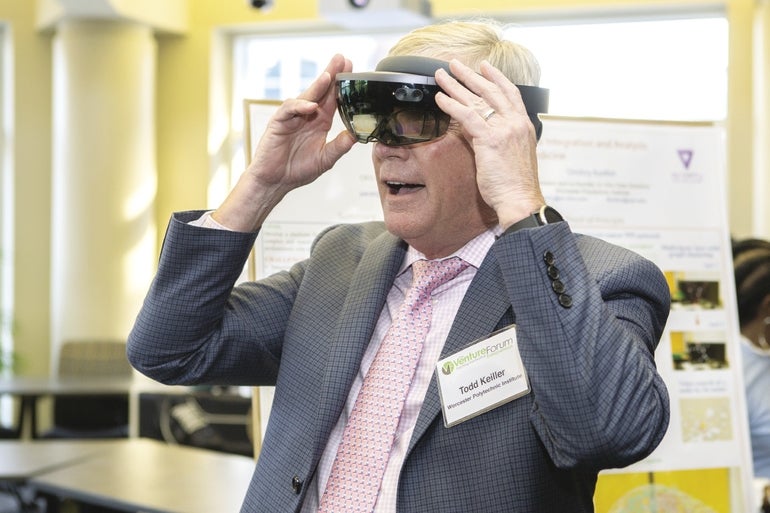Boosters around Worcester are used to fighting to persuade outsiders Central Mass. has much to consider. The same goes for venture capital.
Just 1% of venture capital in Massachusetts in the past five years has come to Worcester County, according to the industry tracker PitchBook, putting Worcester in the shadow of Greater Boston, which itself is beat only by Silicon Valley and New York City when it comes to attracting venture capital.
Economic development and startup leaders in Worcester – like a lot of other smaller markets outside those largest national hubs – are left looking for other ways to nurture startups, while still pitching to deep-pocketed investors.
The Worcester Regional Chamber of Commerce sponsors StartUp Worcester, a competition for funding dollars for budding entrepreneurs. Worcester Polytechnic Institute helps graduates launch companies and invests in them along the way, and the Massachusetts Biomedical Initiatives incubator space at WPI’s Gateway Park gives affordable space, shared equipment, and management and funding-request guidance.
“The trends in Worcester are incredibly encouraging,” said John Hallinan, chief business officer for the Massachusetts Biotechnology Council.
The Massachusetts Biotechnology Council is based in Cambridge’s Kendall Square but works to support the industry statewide, including with an early-stage mentoring program. Hallinan, a Marlborough resident, said Worcester is an important cluster outside Boston.
Making the pitch
Timothy Murray, the president and CEO of the Worcester Regional Chamber of Commerce, is used to having to tout his home city. His perspective comes as a former Worcester mayor and a former lieutenant governor who spent his days in Boston’s center of gravity.
“You have to try changing some perceptions of Worcester from 30 years ago or 40 years ago, that it’s an old manufacturing city,” Murray said.
The pitch often goes something like this: Worcester is home to more than 30,000 college students, hosts UMass Medical School, and has an express commuter rail train to Boston. Increasingly, the impending move of the Pawtucket Red Sox to Worcester is mentioned as an example of strides the city is making.
Murray said he expects venture capital to make its way to Worcester as more economic development investment is made in the surrounding area.
While venture capital can be an important tool for entrepreneurs, startups in the Worcester area are helped in less visible ways, from silent investors to affordable MBI incubator space.
MBI, a nonprofit funded by the state as well as through donations and rent, offers shared equipment for firms to keep costs down. It has helped launch Blue Sky BioServices, now part of drugmaker LakePharma, and Coley Pharmaceutical Group, which was bought by Pfizer for $164 million and is now based in Wellesley.
A new strategic plan for MBI aims to better help startups attract funding, hire the right management or land an acquisition that fits best, said Jon Weaver, MBI’s president and CEO.
“We look at ourselves as extensions of their teams,” Weaver said.

Industry officials are working to get more lab and office space in Worcester, with today’s rents generally too low to make new construction feasible without tenants lined up.
At WPI, more funding is going into helping students leading new startups. The school counts 15 active startups, nearly all in Worcester County, including Battery Resourcers, which is developing a lithium battery recycling technology.
Those companies raised more than $14 million combined in fiscal 2019, said Todd Keiller, the director of WPI’s Office of Technology Commercialization.
WPI is building more of a culture of invention, including supporting startups however it can, Keiller said.
“You wouldn’t see venture capital money yet,” he said of WPI-born startups, “but you will soon.”
Some venture capital does flow into the Worcester area, even if not nearly at the levels Boston area firms see. Last year, RxAdvance, a Southborough pharmacy benefit manager, took in $50 million, and Worcester manufacturer Anchor Labs received $17 million. SimpliVity, a Westborough information technology firm now part of Hewlett Packard Enterprise, received $175 million.
Other funding for research comes into the area through federal grants.
UMass Medical School received $161 million in National Institute of Health funding last fiscal year, and regularly ranks at the top in NIH funding in Mass. for entities outside Boston.
Geographic divide
Worcester can’t come close to attracting the investment Boston sees. But few cities of Worcester’s size can be so close to all that money they can smell it.
“I say we need to embrace our proximity to Boston,” Murray said.
WPI is among those working to close that gap, opening a Seaport meeting-and-work space last year where it holds a startup showcase and pitches the industry on what Worcester has to offer.
Today though, I-495 seems to form a barrier for startups to attract venture capital. When Central Massachusetts firms have attracted major investment, it’s overwhelmingly in places like Marlborough, Framingham or Natick.
Mevion Medical Systems, a Littleton firm making medical devices and equipment, attracted a $200-million investment three years ago. Applause, a Framingham information technology firm, got $43 million in 2014.
Boston’s draw remains strong. The software firm Nasuni moved from Natick to Boston’s Seaport neighborhood. RxAdvantage shows the Boston skyline on its website, but nothing from its home town of Southborough.
Those in Worcester see fortunes now changing. They expect more investors and startups looking to stay in the city or begin looking west and not east.
One of them is Ryan Canuel, who launched the video game startup Petricore just after he graduated from Worcester’s Becker College in 2015.
Petricore got free classroom and office space from Becker, and was the first winner of StartUp Worcester. Canuel said he’s spent a lot of time with industry professionals in Boston who’ve ribbed him about being in Worcester. That’s not the case as often today, he said.
“More and more,” Canuel said of Worcester, “I think people are paying attention.”

